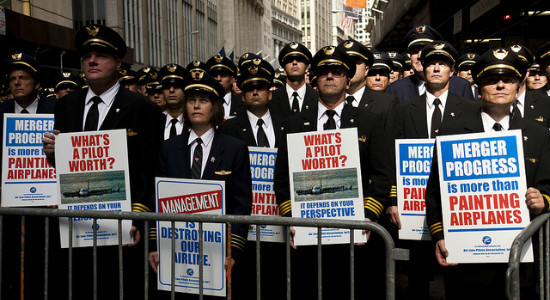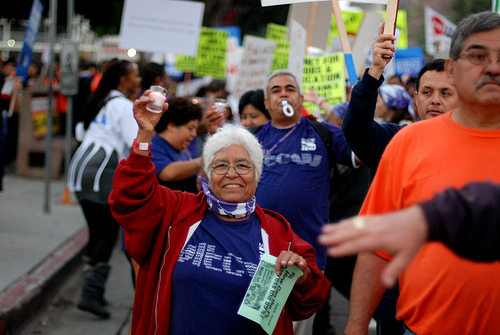Tensions are rising between Occupy protesters and labor unions in Washington, DC. An article in last Thursday’s Examiner reports that Occupy DC will not be lending support to a five-day “Take Back the Capitol” protest put on by labor unions, despite unions’ support of Occupy since October.

700 workers represented by the Air Line Pilots Association marched with Occupy Wall Street in late September (via dailykos)
The reasoning behind the stance may have some clout to it — in the reality of the political spectrum, Republicans and Democrats are practically two wings of the same party, therefore, supporting the ideals of the Democratic Party implicitly means supporting the pay-for-play government structure that Occupy is opposing. But some of the statements released regarding the action (or lack of action) err on the side of hypocritical, juvenile and downright irresponsible, hinting toward butt-hurt ego politics and using accusatory language:
“‘They’re undermining the whole point. We want to take power and give it to the people, not unions,'” said McPherson protester Benjamin Faure. ‘If a union can win over everyone at the square, go ahead and let them try.'”
This is pretty nonsensical, if not at least a little offensive. The labor movement has historically been a movement of and for the people. Unions have fought for living wages, reasonable work weeks, benefits for workers, and preservation of dignity for everyone. Valuing work without without unions can be a slippery slope into the waters of the bootstraps narrative, one which leads us to believe that every one of us is given an equal opportunity to succeed, if only we were willing to work hard enough.
In late September and early October, major labor unions marched with Wall Street occupiers, and it was like a sprouting movement had put down its roots. Maybe the unions can’t “win over everyone at the square,” but securing dignity and safety for individuals doesn’t always take place in the spotlight.
The action was a huge statement of solidarity, and it made a big statement for the occupiers: Take us the fuck seriously. Our message has power and history and validation. We are not speaking out of turn, we are speaking out. On November 30, Occupy DC released its Official Declaration, the list of grievances which includes:
“Those with power have divided us from working in solidarity by perpetuating historical prejudices and discrimination based on perceived race, religion, immigrant or indigenous status, income, age, gender, gender identity, sexual orientation, and disability, among other things. These divisions have inhibited our ability to work in solidarity, though today we recognize the power of uniting as the 99 percent.”
Taking that into account, this break feels like a loss, because occupiers and labor organizers can learn so much from each other. Labor unions may advocate for a different means to an end, but ultimately the end is the same, and so is much of the problem. Occupiers fight corporate culture and challenge its face; labor unions protect those who stand to be exploited by it. Worker training programs at corporations like Target are notorious for anti-union propaganda. Conservatives portray unions as exploitative of people of color. Corporations make structured attempts to divide workers and keep them powerless. Unions and occupiers know that power lies in numbers. It seems contradictory to build a movement that is intentionally pervasive and then accuse pre-existing movements of co-option when they continue to do their work. Intersectionality exists, movements overlap.Where is the line into co-opting drawn, and who gets to draw it? And although this may not be the intent of DC Occupiers, the message that we’re hearing is that calling a movement out on being non-inclusive to women and people of color is divisive, but rejecting factional support preserves integrity. What was supposed to be a solidified, widespread movement has now become a dictation of who is and who isn’t allowed to be in the 99 Percent.
But what would worlds look like where both occupiers and labor rights organizations each saw their visions come true? Probably pretty similar. A world where all people have respect and dignity, regardless of race, class or gender, where we don’t have to be dependent on corporations for jobs or resources. That’s a shift in power. And it has to start somewhere. The workforce is vast and diverse, and respecting workers is something that can be truly revolutionary. What happens when a housekeeper is well-compensated for hard work, long hours and physically exhausting labor? What happens when an undocumented kitchen worker doesn’t have to fear speaking out against an employer’s abuses for fear of deportation? What happens when a server can defend themselves against verbal abuse by customers without fear of losing their job?
Answering these questions is something that can transform a society. We can be a society where we don’t have to be afraid to demand respect. Because a society like that will be made up of people who know what their voices sound like, and those voices won’t be afraid to demand change.
![]()
Disclaimer: The opinions, beliefs and viewpoints expressed by an individual author do not necessarily reflect the opinions, beliefs and viewpoints of Autostraddle or official policies of Autostraddle.





The positive aspect to an organic, horizontal movement is that fortunately the response of DC’s GA doesn’t reflect the general sentiment toward Take Back the Capitol. Occupy Boston for instance has been supportive.
You just said everything I have been thinking for the last week since people at occupy AU have been bringing up issues and concerns with SEIU “co-opting” occupy. There seems to be a conflict between people who cannot see past union’s involvement in the democratic party in order to realize that unions are the legitimate representatives of millions of working people, the 99%, and that working people cannot wait for some vast revolution in the way things work in this country and need good jobs now, not in some abstract future.
It’s real damn simple, and this article seems to purposefully miss the point: Occupy supports workers and will stand with them for their rights. BUT Occupy is angry that labor leaders have endorsed Barack Obama and stand ready to do the same big Democratic GOTV plan they do every four years. Fuck that. Change the system!
This article doesn’t mention the union marshalls pushing and swinging at people when protestors wanted to hold the intersection instead of following their orders to march down 14th St. Yes, we have unions to thank for a great many job benefits and conditions, and mainstream unions still do some good, but bureacratization has turned trade unions into something more akin to corporations. Don’t conflate bureacratic unions with labor in general; alternatives exist, and the concerns about union bosses and their agendas are legitimate–not just for protestors, but for all workers.
There are very valid criticisms to be made of how big unions operate, and whose voices are silenced – but the same can be said of the Occupy movement. Marching in solidarity does not mean accepting and condoning every issue, and working together can make avenues for dialogue and change within progressive movements much easier. Yes, change the system! But we can’t do that when all we’re doing is fighting amongst ourselves. Unity need not happen at the expense of critical examination of what we can do better, and I worry about the ground we lose when we take on a “I’m more conscious than you and therefore your entire approach to social justice is problematic” attitude.
Shorter version: this is a great article!
Is it possible to be “pro-worker” without always being “pro-union?” Because I’d like to try. Because in my experience, the hierarchy of the unions – including the SEIU – does serve the interest of statists, particularly those within the entrenched, Democratic Party.
If we are being honest, why can’t we criticize our brothers and sisters within the labor unions, in particular – the leadership of labor unions – who aren’t always acting in the interest of their rank and file membership? Clearly, such criticism needs to be done with solidarity in mind… but truth be told… a lot of what the SEIU has done on the ground (at least in Los Angeles) with the Occupy Movement has not always been “solidarity building” either.
I am pro-union. I am an occupier. That doesn’t mean I follow in lock-step with everything every particular union does. I should hope that the unions don’t expect such tacit complicity from my fellow occupiers – because we are far from docile, little sheep doing anyone’s bidding…
Let’s have a conversation about union hierarchies instead of scapegoating OccupyDC as being “divisive” for merely entertaining doubts about a particular action…
>>If we are being honest, why can’t we criticize our brothers and sisters within the labor unions, in particular – the leadership of labor unions – who aren’t always acting in the interest of their rank and file membership?>>
Exactly.
When I was in college, I worked at a city swimming pool. After working there for a certain number of years, I was forced to join the union. (Yes, it was compulsory to do so if I wanted to keep my job. And I did.)
I never went to a union meeting, but some of my colleagues did, and what they found is that the rest of the city union members didn’t hold us part-timers in very high respect. Never mind the fact that we were all working our asses off while going to school at the same time – we were lazy, we were just going to leave (okay, maybe *that* was a fair point for most of us, but certainly not all of us), and the union didn’t have to consider our needs (which I would say is not a fair point).
I doubt all unions are like this, and I’m not even sure my union as a whole was or if it was just our branch. But it was pretty sobering for me – I’d always been a union supporter.
(Although without the union, I never would have been able to move to Australia.)
when I first read the title I thought it said “Occupy DC Deserves a Massage”…
Just a question – why is the disclaimer needed all of a sudden?
I’ve seen the disclaimer on other posts.
This is a very good article–I for one have been confused by all of the animosity toward the unions–while I understand some leadership within them may be corrupt, accepting their help (like generators, showers, or money)does not make us their pawns, or beholden to follow their leadership. What has been more disturbing to me is seeing the way the Anarchist movement has seemingly co-opted much of Occupy–all the while claiming its stand against “leadership”. Leadership does not always mean that you are standing at the front of the room telling people what to do–but when you espouse ideas, gather support for them, and then get others to act on them–that is leadership. I have watched as Occupy DC looks more and more like the failed WTO protests, much of it due to Anarchist “non-leadership”. We are not here to scream “F__ You” at the police. We are not here to fix humanity as a whole–this is an economically based protest, and if we succeed, racism, sexism, and other oppressions will be greatly diminished; and solving those problems will become a possibility. There is a lot of talk of being co-opted by people with their own agendas; 99% of this country is being taken advantage of by an elite group of people; 99% is not Anarchist, and neither is this movement.